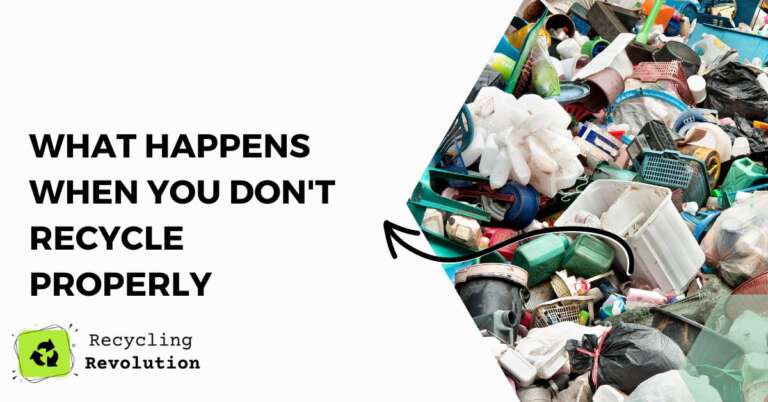It’s true that most of us understand the concept of recycling, but its significance goes far beyond just a civic duty. It’s about saving our planet for future generations.
When recycling isn’t properly executed, the consequences can be rather grim. Allow me to illustrate this with a few talking points:
TL;DR: Failing to recycle properly leads to a variety of adverse effects including environmental pollution, resource depletion, and climate change. A comprehensive recycling process not only conserves natural resources but also mitigates harmful emissions. It’s essential to grasp the gravity of this situation to cultivate an eco-conscious approach towards waste management.
Rampant Environmental Pollution
Firstly, let’s address the elephant in the room – pollution. Improper recycling can lead to severe environmental contamination. When recyclable waste ends up in landfills, it often decomposes, releasing hazardous substances that can contaminate soil and groundwater.
These toxins can then enter our food chain and cause a host of health problems. Not recycling correctly essentially equates to poisoning our own home.
Draining Our Natural Resources
As we continue to fail in recycling, we are depleting our natural resources at an alarming rate. Every plastic bottle or aluminum can that doesn’t get recycled is a direct hit to our limited supply of natural resources.
When we don’t recycle properly, we are essentially accelerating the rate of resource depletion. Recycling is not just an act, it’s a commitment to preserving what’s left of our precious resources.
Climate Change Acceleration
Another significant impact of not recycling properly is that it exacerbates climate change. The manufacturing processes of many materials produce harmful greenhouse gases.
However, recycling often requires less energy than producing goods from raw materials, thereby reducing greenhouse gas emissions. Therefore, failing to recycle isn’t just about waste – it’s about climate change too.
A Step-by-step Guide to Recycling Properly
Becoming a competent recycler is not as daunting as it may seem. Here are some fundamental steps to get you started on the right path:
- Understanding What Can be Recycled: Not everything can be recycled. Familiarize yourself with your local recycling guidelines.
- Clean Your Recyclables: Dirty recyclables can contaminate an entire batch of recycling. Ensure your items are clean before recycling.
- Separate Your Waste: Keep your recyclables separate from other waste to prevent contamination.
Note: It’s essential to remember that recycling is the last resort. Try to implement the 3 R’s – Reduce, Reuse, and Recycle, in that order.
The Consequences of Incorrect Recycling
Incorrect recycling, also known as “aspirational” or “wishful” recycling, can be equally damaging. When non-recyclable items are placed in recycling bins, it can contaminate the entire batch, making it all but unusable.
This leads to more waste being sent to landfills. Hence, I recommend learning the specifics of what you can and cannot recycle in your community.
Strain on Landfills
Landfills across the globe are already teetering on the brink of their capacities. Every piece of recyclable material that ends up in a landfill is not just a missed opportunity for reuse; it’s also adding to this rapidly growing problem.
As we keep dumping more and more waste into landfills, we also face another alarming consequence – the production of methane, a potent greenhouse gas. When organic waste in landfills decomposes, it releases methane into the atmosphere.
According to the U.S. Environmental Protection Agency, landfills are the third-largest source of methane emissions in the country. So, not recycling properly is inadvertently contributing to the warming of our planet.
Economic Consequences of Not Recycling Properly
Recycling isn’t just beneficial from an environmental perspective; it also makes good economic sense. The more we recycle, the less reliant we become on the costly process of extracting and refining raw materials. This can lead to significant savings on manufacturing costs, which can ultimately result in lower prices for consumers.
Moreover, the recycling industry itself can be a significant source of jobs. According to the U.S. Bureau of Labor Statistics, the recycling and reuse industry consists of approximately 10,000 firms employing over 1.1 million people, generating an annual payroll of nearly $37 billion.
So when we don’t recycle properly, we are not only hampering our economy but also missing out on potential job opportunities.
The Societal Ripple Effect
Perhaps one of the less obvious but equally impactful consequences of not recycling properly is the ripple effect it creates in society. When people observe that recycling norms aren’t being followed, they might also start to neglect them, leading to a vicious cycle that’s hard to break.
On the flip side, when we recycle properly and consistently, it sends out a powerful message to our community. Our actions could inspire others to adopt better recycling habits, creating a positive ripple effect. Thus, proper recycling is as much about setting the right societal norms as it is about waste management.
Enhancing Your Recycling Efforts
While we’ve touched on some basic steps to recycle properly, there are a few more strategies you can employ to elevate your recycling game:
- Composting: Organic waste like fruit peels, vegetable scraps, and coffee grounds can be composted at home, reducing the amount of waste that ends up in landfills.
- Educate Yourself: Stay updated with the latest in recycling technology and guidelines. The recycling landscape can change frequently, so it’s important to keep up with these changes.
- Spread the Word: Share your knowledge about recycling with your friends, family, and community. The more people recycle correctly, the bigger the impact we can make.
Remember, the key to successful recycling is consistency. It may take some time and effort to incorporate these habits into your daily routine, but the payoff is well worth it. Every step we take towards recycling correctly is a step towards a healthier and more sustainable planet.
Note: Always remember that while recycling is a crucial part of waste management, it’s equally important to focus on reducing and reusing. This holistic approach is what will truly make a difference in the long run.
Making a Difference One Can at a Time
Every step towards proper recycling matters. Even small acts like ensuring your plastic bottles are clean and dry before recycling can make a significant difference. Remember, recycling isn’t about being perfect; it’s about being conscious of our decisions and their impacts.
Conclusion
In the grand scheme of things, failing to recycle properly contributes to the degradation of our environment and hastens the pace of climate change.
We need to understand that every item that isn’t recycled correctly is a missed opportunity to save our planet. Let’s step up, do our part, and usher in a future where waste is but a distant memory.
FAQs
Can all plastics be recycled?
No, not all plastics can be recycled. The recyclability of plastic depends on its type and local recycling programs.
Do I need to clean items before recycling them?
Yes, you should rinse recyclable containers to prevent contamination.
Is it important to separate my waste for recycling?
Absolutely! Different types of waste require different recycling processes. Mixing them can lead to contamination and render the entire batch useless.

